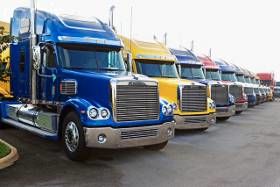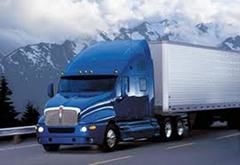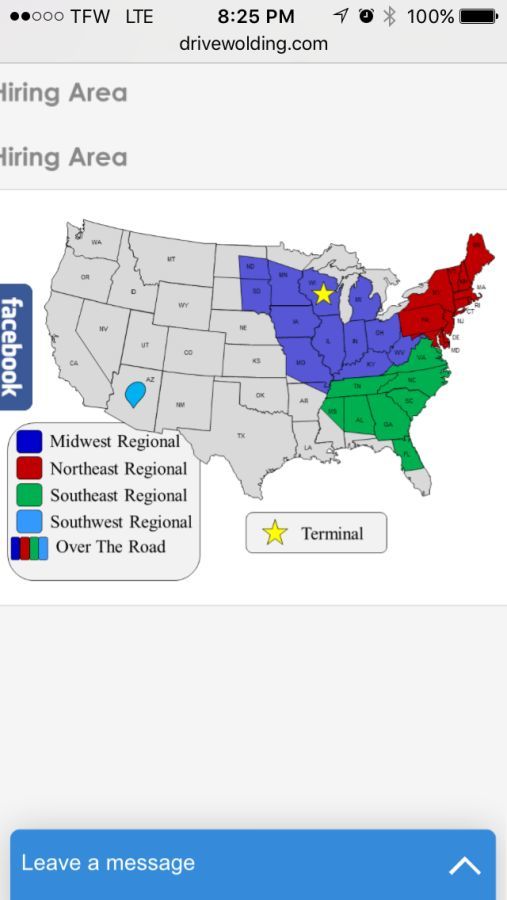Anyone Pay For CDL To Get Local/regional Job?
Topic 23164 | Page 1
Where do you live. Your best bet is to try to get into a dock to driver program. These are usually given by LTL companies. The ones who deliver daily to businesses. A few of the bigger ones are Old Dominion, Southeastern Freight, Holland, and Averit. These programs are highly competitive. Paying several thousand dollars for your CDL won't help you. Before paying, I would get a pre hire letter from the company you expect to work for. Here is our starter pack of information.
- Truck Driver's Career Guide
- Brett's Book: The Raw Truth About Trucking (free online version)
- High Road CDL Training Program
- CDL Practice Tests
And
- Article: Understanding Pre-Hire Letters: The What, Why, And How Of This Important Step
- Trucker's Wiki: "Pre-Hire Letters"
- Forum Topics Tagged "CDL Pre-Hire Letters"
Good luck.
CDL:
Commercial Driver's License (CDL)
A CDL is required to drive any of the following vehicles:
- Any combination of vehicles with a gross combined weight rating (GCWR) of 26,001 or more pounds, providing the gross vehicle weight rating (GVWR) of the vehicle being towed is in excess of 10,000 pounds.
- Any single vehicle with a GVWR of 26,001 or more pounds, or any such vehicle towing another not in excess of 10,000 pounds.
- Any vehicle, regardless of size, designed to transport 16 or more persons, including the driver.
- Any vehicle required by federal regulations to be placarded while transporting hazardous materials.
LTL:
Less Than Truckload
Refers to carriers that make a lot of smaller pickups and deliveries for multiple customers as opposed to hauling one big load of freight for one customer. This type of hauling is normally done by companies with terminals scattered throughout the country where freight is sorted before being moved on to its destination.
LTL carriers include:
- FedEx Freight
- Con-way
- YRC Freight
- UPS
- Old Dominion
- Estes
- Yellow-Roadway
- ABF Freight
- R+L Carrier
Pre-hire:
What Exactly Is A Pre-Hire Letter?
Pre-hire letters are acceptance letters from trucking companies to students, or even potential students, to verify placement. The trucking companies are saying in writing that the student, or potential student, appears to meet the company's minimum hiring requirements and is welcome to attend their orientation at the company’s expense once he or she graduates from truck driving school and has their CDL in hand.
We have an excellent article that will help you Understand The Pre-Hire Process.
A Pre-Hire Letter Is Not A Guarantee Of Employment
The people that receive a pre-hire letter are people who meet the company's minimum hiring requirements, but it is not an employment contract. It is an invitation to orientation, and the orientation itself is a prerequisite to employment.
During the orientation you will get a physical, drug screen, and background check done. These and other qualifications must be met before someone in orientation is officially hired.
Pre Hire:
What Exactly Is A Pre-Hire Letter?
Pre-hire letters are acceptance letters from trucking companies to students, or even potential students, to verify placement. The trucking companies are saying in writing that the student, or potential student, appears to meet the company's minimum hiring requirements and is welcome to attend their orientation at the company’s expense once he or she graduates from truck driving school and has their CDL in hand.
We have an excellent article that will help you Understand The Pre-Hire Process.
A Pre-Hire Letter Is Not A Guarantee Of Employment
The people that receive a pre-hire letter are people who meet the company's minimum hiring requirements, but it is not an employment contract. It is an invitation to orientation, and the orientation itself is a prerequisite to employment.
During the orientation you will get a physical, drug screen, and background check done. These and other qualifications must be met before someone in orientation is officially hired.
Depending on where you live and the terminals needs Old Dominion may hire you right out of school. If your interested in linehaul or P&D I would give my local terminal a call. They even have a option at some locations to get your CDL for free but you have to work the dock first.
CDL:
Commercial Driver's License (CDL)
A CDL is required to drive any of the following vehicles:
- Any combination of vehicles with a gross combined weight rating (GCWR) of 26,001 or more pounds, providing the gross vehicle weight rating (GVWR) of the vehicle being towed is in excess of 10,000 pounds.
- Any single vehicle with a GVWR of 26,001 or more pounds, or any such vehicle towing another not in excess of 10,000 pounds.
- Any vehicle, regardless of size, designed to transport 16 or more persons, including the driver.
- Any vehicle required by federal regulations to be placarded while transporting hazardous materials.
Terminal:
A facility where trucking companies operate out of, or their "home base" if you will. A lot of major companies have multiple terminals around the country which usually consist of the main office building, a drop lot for trailers, and sometimes a repair shop and wash facilities.
P&D:
Pickup & Delivery
Local drivers that stay around their area, usually within 100 mile radius of a terminal, picking up and delivering loads.
LTL (Less Than Truckload) carriers for instance will have Linehaul drivers and P&D drivers. The P&D drivers will deliver loads locally from the terminal and pick up loads returning to the terminal. Linehaul drivers will then run truckloads from terminal to terminal.
Linehaul:
Linehaul drivers will normally run loads from terminal to terminal for LTL (Less than Truckload) companies.
LTL (Less Than Truckload) carriers will have Linehaul drivers and P&D drivers. The P&D drivers will deliver loads locally from the terminal and pick up loads returning them to the terminal. Linehaul drivers will then run truckloads from terminal to terminal.Yes I did exactly that. Paid 6k and made promises to myself and my wife that I wouldn't do OTR. It's not the easiest thing to do, and depending on your area jobs be limited for local work. There's plenty of companies that do primarily local stuff though. LTL companies like OD, XPO, YRC. There's food and beverage like Sysco, Pepsi, National distributors. You just need to prepare yourself though. Local driving presents challenges that a lot of OTR guys don't get a lot of, and not having any experience makes things that much harder. It can certainly be done but it's not easy.
LTL:
Less Than Truckload
Refers to carriers that make a lot of smaller pickups and deliveries for multiple customers as opposed to hauling one big load of freight for one customer. This type of hauling is normally done by companies with terminals scattered throughout the country where freight is sorted before being moved on to its destination.
LTL carriers include:
- FedEx Freight
- Con-way
- YRC Freight
- UPS
- Old Dominion
- Estes
- Yellow-Roadway
- ABF Freight
- R+L Carrier
OTR:
Over The Road
OTR driving normally means you'll be hauling freight to various customers throughout your company's hauling region. It often entails being gone from home for two to three weeks at a time.

I did. Paid $4k and took up with Werner. Run in the northeast, out of a drop yard near Philly, home weekly. It can be done, you'll have to do your homework and find the right fit for you.

I also paid my own way and went right into a regional position. Home weekly. Depending on your school, you'll talk to at least a few companies that will hire you right out of school. I probably saw 6-8 or more before I got through.
Regional:
Regional Route
Usually refers to a driver hauling freight within one particular region of the country. You might be in the "Southeast Regional Division" or "Midwest Regional". Regional route drivers often get home on the weekends which is one of the main appeals for this type of route.
H.O. wolding will hire directly into a Regional or even hourly job right out of school. The hourly positions are home most nights and weekends off. Midwest hourly- live within an hour or so from Amherst, WI Northeast hourly based along I-90 corridor. Regional areas are Midwest, Northeast, Southeast, & Southwest.

Regional:
Regional Route
Usually refers to a driver hauling freight within one particular region of the country. You might be in the "Southeast Regional Division" or "Midwest Regional". Regional route drivers often get home on the weekends which is one of the main appeals for this type of route.
Hello Ken, and welcome to our forum!
Can you clarify a few things for us so we can advise you properly? You asked a couple of different things that are a little confusing to me. You'd like to know this...
Does anyone here see a problem with my plan of paying for my CDL and getting a start, with the plan of getting a regional job eventually?
There's certainly nothing wrong with that plan as long as you're willing to go Over The Road for a season to help establish some valuable experience. More on that in just a minute, but you also made this statement...
I'm thinking of changing careers to truck driving, but I can't go over-the-road and leave my disabled wife alone.
So, I'm confused as to what your approach to this career actually is. It may just be semantics that are confusing me, but you mentioned the word "regional" and that is generally still considered as an over the road job with the advantage of staying within the confines of a region of the country so that you can still be home for approximately 34 hours a week.
It isn't clear how much time you are needing at home with your disabled wife, but even local truck driving jobs require usually 12 plus hour long days. I'm definitely not a proponent of Starting This Career As A Local Driver. There are a lot of issues with local driving jobs. They are so demanding that they kill many driving careers before they even make a good start. The reason they are not as readily available for new drivers is that they are generally challenging beyond most new driver's abilities.
By starting out Over The Road you can develop skills and instincts that will help you tremendously as you enter into the more challenging local jobs. That is foremost in my reasoning for being such a proponent of taking a Prudent Approach To Starting A Truck Driving Career.
I also am concerned that you are thinking of this as just switching to a different job. Truck driving is very demanding. It takes a lot of Commitment. It generally involves long hours followed by a limited time to rest at home. It seems to me that your obligations at home may not fit well with this career, and that's why I would like you to provide us with some clarity on your needs on the home front.
CDL:
Commercial Driver's License (CDL)
A CDL is required to drive any of the following vehicles:
- Any combination of vehicles with a gross combined weight rating (GCWR) of 26,001 or more pounds, providing the gross vehicle weight rating (GVWR) of the vehicle being towed is in excess of 10,000 pounds.
- Any single vehicle with a GVWR of 26,001 or more pounds, or any such vehicle towing another not in excess of 10,000 pounds.
- Any vehicle, regardless of size, designed to transport 16 or more persons, including the driver.
- Any vehicle required by federal regulations to be placarded while transporting hazardous materials.
Regional:
Regional Route
Usually refers to a driver hauling freight within one particular region of the country. You might be in the "Southeast Regional Division" or "Midwest Regional". Regional route drivers often get home on the weekends which is one of the main appeals for this type of route.
Over The Road:
Over The Road
OTR driving normally means you'll be hauling freight to various customers throughout your company's hauling region. It often entails being gone from home for two to three weeks at a time.

I paid for my schooling in hopes of finding a local job. It can be done, but you have to go in to this with your eyes wide open. Local jobs usually require at least one year experience. Those that don't can present some difficult challenges for a new driver. There are companies that will try to take advantage of the lack of experience and do their best to get that new driver to drive illegally and/or unsafe. Not all companies are like that, but some do exist. Those that do not fit in that category will still have a new driver running out their clock more often than not. Daily home time may be just your 10 hour break, eat sleep repeat. Not to mention that you will always be dealing with heavy city traffic. That in itself can frazzled a veteran driver, for a new driver it can be a nightmare. You may be lucky enough to find a company that fits in its own category, Monday through Friday 8-5. Very rare, but they do exist! The trade off there is usually in pay, as in much lower pay than you would expect.
HOS:
Hours Of Service
HOS refers to the logbook hours of service regulations.
Daily home time may be just your 10 hour break, eat sleep repeat.
This right here needs some better explanation.
You find a job that can be an hour away with traffic. So of your 10 hour daily break, you spend two hours communting. You get home and take 2 hours to eat and shower. Now you have a total of 6 hours before you need to leave for work. Do you sleep or spend time with the family?
A forum member and great friend of mine left my company for a local job. He now does exactly as stated above, and because he makes less money, he has to work 6 days a week. He is working his full 14 hour clock every day, and because saturday is overtime, if something goes wrong on saturday and he cannot fit a 34 hour break to give him a full 70 clock for his Mon, he is reprimanded as if he didnt report to work.
I asked him, and he says he had a lot more freedom and was a lot less exhausted while OTR. Plus, he has to unload his own trailer. So on top.of all the mental strain and long days/week, he cant even relax during unloading. And he had a full year OTR before going. There are tons of rookie mistakes you make out here and things like turning radius, backing, and gaining judgement is something you need for local work and can build by doing OTR work. Local roads and customer lots are often very tiny and tough for newbies.
And...as you read the responses... "local" to many is home weekly. You sound like you want drive during the day, be home at night. So here's another thought for you... my same friend doesnt work 8am to 8pm or such. He works noon until 2am. So he sees his wife for an hour in the morning before she heads to work. She's asleep when he comes home.
Just a realistic image here.
OTR:
Over The Road
OTR driving normally means you'll be hauling freight to various customers throughout your company's hauling region. It often entails being gone from home for two to three weeks at a time.
New Reply:
New! Check out our help videos for a better understanding of our forum features

















Preview:
This topic has the following tags:
Becoming A Truck Driver Getting Your CDL Local CDL Drivers







 TT On Facebook
TT On Facebook
I'm thinking of changing careers to truck driving, but I can't go over-the-road and leave my disabled wife alone.
I've seen a few job offers that aren't OTR , they just want you to have your CDL.
So I'm looking into paying $4,200 to a school to get my CDL so I can have one of these local jobs.
Some are with waste managament companies, but at least one was with Home Depot, home daily, they were just looking for CDL and three months experience.
Does anyone here see a problem with my plan of paying for my CDL and getting a start, with the plan of getting a regional job eventually?
CDL:
Commercial Driver's License (CDL)
A CDL is required to drive any of the following vehicles:
Regional:
Regional Route
Usually refers to a driver hauling freight within one particular region of the country. You might be in the "Southeast Regional Division" or "Midwest Regional". Regional route drivers often get home on the weekends which is one of the main appeals for this type of route.
OTR:
Over The Road
OTR driving normally means you'll be hauling freight to various customers throughout your company's hauling region. It often entails being gone from home for two to three weeks at a time.